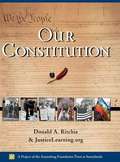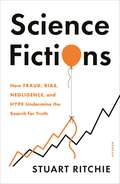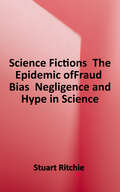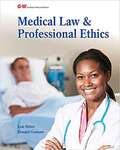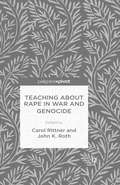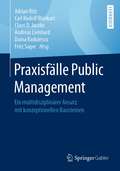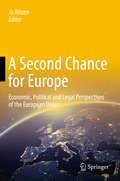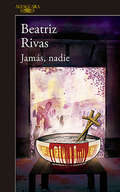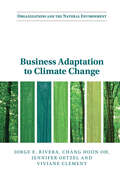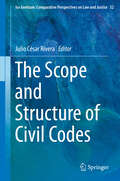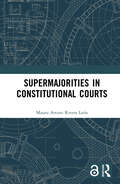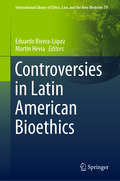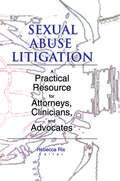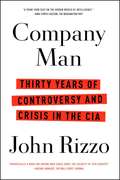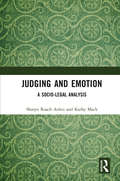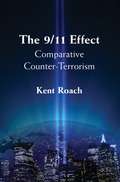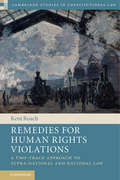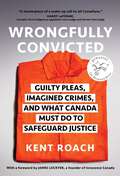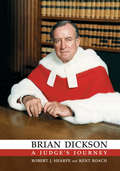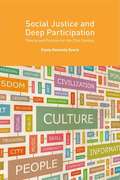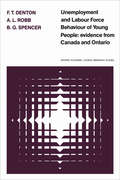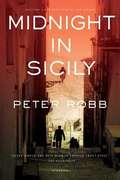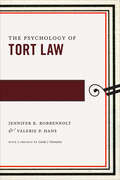- Table View
- List View
Our Constitution
by Donald A. RitchieAn in-depth look at the entire text of the U. S. Constitution, annotated with detailed explanations of its terms and contents. Each Amendment and Article is accompanied by sidebar material on the history of its application, including profiles of important Supreme Court cases, texts of related primary source documents, and contemporary news articles. Double page timelines for several of the Articles and all the Amendments highlight important events and legal cases.
Science Fictions: How Fraud, Bias, Negligence, and Hype Undermine the Search for Truth
by Stuart RitchieAn insider’s view of science reveals why many scientific results cannot be relied upon – and how the system can be reformed.Science is how we understand the world. Yet failures in peer review and mistakes in statistics have rendered a shocking number of scientific studies useless – or, worse, badly misleading. Such errors have distorted our knowledge in fields as wide-ranging as medicine, physics, nutrition, education, genetics, economics, and the search for extraterrestrial life. As Science Fictions makes clear, the current system of research funding and publication not only fails to safeguard us from blunders but actively encourages bad science – with sometimes deadly consequences.Stuart Ritchie’s own work challenging an infamous psychology experiment helped spark what is now widely known as the “replication crisis,” the realization that supposed scientific truths are often just plain wrong. Now, he reveals the very human biases, misunderstandings, and deceptions that undermine the scientific endeavor: from contamination in science labs to the secret vaults of failed studies that nobody gets to see; from outright cheating with fake data to the more common, but still ruinous, temptation to exaggerate mediocre results for a shot at scientific fame.Yet Science Fictions is far from a counsel of despair. Rather, it’s a defense of the scientific method against the pressures and perverse incentives that lead scientists to bend the rules. By illustrating the many ways that scientists go wrong, Ritchie gives us the knowledge we need to spot dubious research and points the way to reforms that could make science trustworthy once again.
Science Fictions Exposing Fraud, Bias, Negligence and Hype in Science
by Stuart RitchieIn this vital investigation, the author reveals the disturbing flaws in today's science that undermine our understanding of the world and threaten human lives. With bias, careless mistakes and even outright forgery influencing everything from austerity economics to the anti-vaccination movement, he proposes vital remedies to save and protect science - this most valuable of human endeavours - from itself.
Land Bargains and Chinese Capitalism
by Meg E. RithmireLand reforms have been critical to the development of Chinese capitalism over the last several decades, yet land in China remains publicly owned. This book explores the political logic of reforms to land ownership and control, accounting for how land development and real estate have become synonymous with economic growth and prosperity in China. Drawing on extensive fieldwork and archival research, the book tracks land reforms and urban development at the national level and in three cities in a single Chinese region. The study reveals that the initial liberalization of land was reversed after China's first contemporary real estate bubble in the early 1990s and that property rights arrangements at the local level varied widely according to different local strategies for economic prosperity and political stability. In particular, the author links fiscal relations and economic bases to property rights regimes, finding that more 'open' cities are subject to greater state control over land.
Medical Law and Professional Ethics
by Lois Ritter Donald GrahamMedical Law and Professional Ethics focuses on the interrelationship of healthcare, law, and ethics and the application of legal and ethical principles to the healthcare field. This introductory text covers topics such as patient and healthcare-provider rights and related laws, legal issues related to health information technology, and medical-legal issues across the lifespan. In addition, situations and dilemmas that arise when professional roles and personal ethics collide are explored. Special features include case studies, court cases, and “what-if?” ethical scenarios that promote critical thinking and foster class discussion. An engaging career-focus feature introduces students to a broad range of professions in which medical law and professional ethics intersect. <P><P>Chapter-review material includes a variety of questions and activities to reinforce comprehension of key concepts covered in the text. Logically organized chapter content, straightforward writing, and dynamic visual aids promote and reinforce student understanding. Ethical scenarios go beyond familiar, high-profile cases by addressing situations and dilemmas more common in everyday life. Rather than focusing on how to avoid litigation, the use of law and ethics to improve healthcare systems and the delivery of care is emphasized and encouraged.
Teaching About Rape in War and Genocide
by Carol Rittner John K. RothThis edited volume is both a guide for educators and a resource for everyone who wants to strengthen resistance against a major atrocity that besieges human development. Its contributors explore a crucial question: how to teach about rape in war and genocide?
Praxisfälle Public Management: Ein multidisziplinärer Ansatz mit konzeptionellen Bausteinen
by Adrian Ritz Carl Rudolf Blankart Claus D. Jacobs Andreas Lienhard Doina Radulescu Fritz SagerDieses Lehrbuch präsentiert eine multidisziplinäre Fallstudiensammlung zum Public Management. Die 30 Praxisfälle basieren auf realen Ereignissen und repräsentieren aktuelle Aspekte der Verwaltungsführung, zu deren ergebnis- und handlungsorientierter sowie kritischer Betrachtung der Leser angeregt wird.Der erste Teil des Buches besteht aus den Praxisfällen, die nach sechs Themenfeldern geordnet sind. Nach der Fallbeschreibung folgen jeweils Aufgaben und Literaturhinweise zur Lösung des Falls. Der zweite Teil enthält die theoretisch-konzeptionellen Bausteine, welche das Hintergrundwissen für die Lösung der jeweiligen Fallstudie bereitstellen. Dozierende finden zudem ausformulierte Lösungsskizzen auf der Website des Buches auf springer.com.
A Second Chance for Europe: Economic, Political and Legal Perspectives of the European Union
by Jo RitzenThis book calls upon us to rethink and reboot the European Union. The authors dissect the EU's many vulnerabilities: how some Member States are backsliding on the rule of law, freedom of the press, and control of corruption - and how globalization's 'discontents' are threatening the liberal international order. It examines the need for a common immigration policy; the need to rethink the unsustainable debt overhang of some Eurozone countries; and the need to use education to foster a European identity. Given the sum total of these vulnerabilities, the book argues, the EU may not survive beyond 2025 in its present form - that is, unless decisive action is taken. In turn, the book puts forward a number of workable solutions: a European economic model to secure full employment; a stronger European Court of Human Rights to counter systemic violations; a points-based immigration policy; clear exit options for the Eurozone; and an Open Education Area with a common second language. These solutions may reduce the number of EU countries, but would increase cohesion and overall survivability.
“Trash,” Censorship, and National Identity in Early Twentieth-Century Germany
by Kara L. RitzheimerConvinced that sexual immorality and unstable gender norms were endangering national recovery after World War One, German lawmakers drafted a constitution in 1919 legalizing the censorship of movies and pulp fiction, and prioritizing social rights over individual rights. These provisions enabled legislations to adopt two national censorship laws intended to regulate the movie industry and retail trade in pulp fiction. Both laws had their ideological origins in grass-roots anti-'trash' campaigns inspired by early encounters with commercial mass culture and Germany's federalist structure. Before the war, activists characterized censorship as a form of youth protection. Afterwards, they described it as a form of social welfare. Local activists and authorities enforcing the decisions of federal censors made censorship familiar and respectable even as these laws became a lightning rod for criticism of the young republic. Nazi leaders subsequently refashioned anti-'trash' rhetoric to justify the stringent censorship regime they imposed on Germany. Examines the connections between youth protection, social welfare, and censorship in late Imperial and Weimar Germany. Locates Weimar Germany's two censorship laws in post-war anxieties about gender and the new constitution's prioritization of social rights over legal rights. Uses anti-'trash' campaigns to examine national identity in late Imperial and Weimar Germany.
Jamás, nadie
by Beatriz Rivas"Yan vivió el resto de su existencia con el peso del sobreviviente. Un peso invisible pero despiadado." A lo largo de la historia y hoy en día, miles de migrantes huyen a diario de la miseria, de la violencia, de la guerra, de la hambruna, de la injusticia, arriesgando la vida en busca de una utopía, de una tierra donde empezar de nuevo y poder trabajar y vivir con dignidad# pero la realidad suele ser cruel e implacable. She Yan, el protagonista de esta novela, tiene apenas quince años cuando viaja de China hacia México en busca de una mejor vida, pues la sequía en Cantón empuja a su familia a dejar lo más querido para asegurar la sobrevivencia. Y así, en pleno año 1910, llega a Torreón, ciudad en el norte del país donde se esmera en el trabajo, sin queja y con devoción, hasta que la ignorancia, la envidia y el odio lo envuelven en un torbellino de sangre y muerte. Vital y cruda, amorosa y despiadada, esta novela inicia con una masacre y llega a territorios insospechados en los que Mía, la hija mexicana de Yan, descubrirá un camino hacia el reencuentro con un pasado doloroso y entrañable que la hará transformarse. Jamás, nadie podrá entender la intolerancia, el rechazo a lo distinto. El racismo, la xenofobia. El odio irracional ante lo extraño, lo "extranjero". La crítica ha dicho# "[Beatriz Rivas] nos muestra que cualquier indicio es suficiente para desdoblarnos en otros, para crear mundos cargados de complejidad, matizados siempre por un punto de vista humano, analítico, poético y erótico# Y ello sólo se consigue por medio de un oficio literario constante y bien empleado." Universidad de México "El impulso por escribir Todas mis vidas posibles, tercera novela de Beatriz Rivas, le vino luego de buscar su nombre en Google y encontrar un sinfín de vidas posibles, mientras el hilo conductor de la novela surge a raíz de una carta de William Coday, un convicto en Estados Unidos, quien se puso en contacto con la autora a propósito de La hora sin diosas, primer trabajo literario de la autora que impresionó al preso. Su novela es una exploración sobre la naturaleza humana, pero visto desde los personajes femeninos." El Clarín
Business Adaptation to Climate Change (Organizations and the Natural Environment)
by Jorge E. Rivera Chang Hoon Oh Jennifer Oetzel Viviane ClementThis book seeks to advance the understanding of how businesses may adapt to climate change trends. Specifically, it focuses on two general research questions: Firstly, how do businesses adapt to chronic slow-onset nature adversity conditions linked to climate change? Secondly, how do firms adapt to weather-related natural disasters exacerbated by climate change? In the first part of the book, the authors develop a conceptual framework in response to these questions. In the second part, they test this framework using multiple empirical studies involving large data analyses of: (a) the U.S. western ski industry adaptation to warmer temperatures, and (b) the effect of natural disasters on the foreign investment of multinational corporations around the world. This book will interest management and public policy students and scholars researching successful business climate change adaptation strategies, as well as business and non-profit organization leaders and policy makers involved in developing and promoting such effective strategies.
The Scope and Structure of Civil Codes
by Julio César RiveraThis detailed analysis of the content and configuration of civil codes in diverse jurisdictions also examines their relationship with some branches of private law as: family law, commercial law, consumer law and private international law. It analyzes the codification, decodification and recodification processes illuminating the dialogue between current codes - and private law legislation in general - with Constitutions and International Conventions. The commentary elucidates the changing requirements of civil law as it shifted from an early protection of patrimony to a support for commercial and contractual law. It also explains the varying trajectories of civil law, which in some jurisdictions was merged with religious legal tenets in its codification of familial relations, while in others it was fused with commercial law or, indeed, codified from scratch as a discrete legal corpus. Elsewhere, the volume provides material on differing approaches to consumer law, where relevant legislation may be scattered across numerous statutes, and also on private international law, a topic of increasing relevance in a world where business corporations have interests in multiple jurisdictions (and often play one off against another). The volume features invited contributions from leading scholars in the field of private law brought together for an in depth analysis of the current regulatory attitude in this field of the law in jurisdictions with diverse legal systems and traditions. In current times we are witnessing the adoption of diverging regulatory solutions. Through the analysis of the past and present of private law regulation, the volume unveils the underlying trends and relevance of the codification method across the world.
Supermajorities in Constitutional Courts
by Mauro Arturo Rivera LeónConstitutional adjudication is a subject of fascination for scholars. Judges may annul the will of a democratically elected Parliament in counter-majoritarian fashion. Although conceived as a remedy against majoritarianism, judges also decide cases by voting. Whether they do so through simple majorities or supermajorities is not trivial.The debate around supermajorities has awakened anew amidst theories of judicial limitation and new conceptions of judicial review. This book advances our knowledge of systems employing supermajorities in constitutional adjudication by performing a comparative analysis of ten jurisdictions and twelve supermajority models. It introduces a typology of the main models of institutional design, the reasons leading policymakers to establish them, and the impact supermajorities have on courts. It explores the question of whether supermajorities grant deference and foster consensus, or if they disable constitutional courts from exercising judicial review. By analyzing the history, practice, and effects of supermajority rules in courts, this book contributes to an ongoing conversation on the democratic implications of voting protocols in constitutional courts. It will be a valuable resource for policy-makers, scholars, and researchers working in the areas of comparative constitutional law and constitutional politics.The Open Access version of this book, available at http://www.taylorfrancis.com, has been made available under a Creative Commons Attribution (CC-BY) 4.0 license.
Controversies in Latin American Bioethics (International Library of Ethics, Law, and the New Medicine #79)
by Eduardo Rivera-López Martin HeviaThis book offers a first rate selection of academic articles on Latin American bioethics. It covers different issues, such as vulnerability, abortion, biomedical research with human subjects, environment, exploitation, commodification, reproductive medicine, among others. Latin American bioethics has been, to an important extent, parochial and unable to meet stringent international standards of rational philosophical discussion. The new generations of bioethicists are changing this situation, and this book demonstrates that change. All articles are written from the perspective of Latin American scholars from several disciplines such as philosophy and law. Working with the tools of analytical philosophy and jurisprudence, this book defends views with rational argument, and opening for pluralistic discussion.
Sexual Abuse Litigation: A Practical Resource for Attorneys, Clinicians, and Advocates
by Rebecca A RixPrepare a solid case with advice from successful litigators!Ideal for use as a legal guide or a practical reference, Sexual Abuse Litigation examines how professionals can responsibly and effectively advocate on behalf of adult survivors of child sexual abuse (CSA) in the midst of the controversies surrounding recovered memories. This comprehensive book places the current recovered-memory controversy in historical context and examines how various psychological and medical conceptions of trauma have shaped public opinion and the construction of delayed discovery statutes of limitations. For lawyers, advocates, clinicians, and CSA survivors, Sexual Abuse Litigation offers practical advice in clear prose and an easy-to-use format. Summaries, charts, legal practice tips, and samples of actual testimony make this book an invaluable reference tool. It also tabulates the statutes of limitations for sexual abuse cases in all fifty states. In Sexual Abuse Litigation, experienced litigators will guide you through the phases of the legal process, offering practical suggestions on: case evaluation and development the pitfalls and opportunities of professional cooperation between therapists and lawyers the effective use of plaintiff expert witnesses strategies for countering the ”false memories” defense the identification of insurance benefits for injuries related to CSA techniques for cross-examining expert witnesses for the defense vital networking information, including resource referrals for adult survivors, help with appellate cases, and information on abuse by clergy and other professionalsOffering strategies for sustaining the admissibility of the CSA survivor's testimony and how to maintain focus on the question of whether abuse occurred, Sexual Abuse Litigation will give you or your client the necessary information on how to successfully prepare for a CSA case and face the challenges of such cases in the courtroom.
Company Man: Thirty Years of Controversy and Crisis in the CIA
by John RizzoThe “revealing” (The New Yorker) insider history of the CIA from a lawyer with a “front-row seat on the hidden world of intelligence” (The Washington Post). Former CIA director George J. Tenet called Company Man a “must read.”Over the course of a thirty-four-year (1976-2009) career, John Rizzo served under eleven CIA directors and seven presidents, ultimately becoming a controversial public figure and a symbol and victim of the toxic winds swirling in post-9/11 Washington. In Company Man, Rizzo charts the CIA’s evolution from shadowy entity to an organization exposed to new laws, rules, and a seemingly never-ending string of public controversies. As the agency’s top lawyer in the years after the 9/11 attacks, Rizzo oversaw actions that remain the subject of intense debate, including the rules governing waterboarding and other “enhanced interrogation techniques.”Rizzo writes about virtually every significant CIA activity and controversy over a tumultuous, thirty-year period. His experiences illuminate our nation’s spy bureaucracy, offering a unique primer on how to survive, and flourish, in a high-powered job amid decades of shifting political winds. He also provides the most comprehensive account of critical events, like the “torture tape” fiasco surrounding the interrogation of Al Qaeda suspect Abu Zubayadah, and the birth, growth, and death of the enhanced interrogation program. Company Man is the most authoritative insider account of the CIA ever written—a groundbreaking, timely, and remarkably candid history of American intelligence. This is “emphatically a book for anyone who cares about the security of this country” (The Wall Street Journal).
Judging and Emotion: A Socio-Legal Analysis
by Sharyn Roach Anleu Kathy MackJudges embody impartial legal authority. They are the nexus between formal abstract law, the legal institution of the court, and the practical tasks of making and communicating decisions. Because emotions are often viewed as inherently irrational, disorderly, impulsive and personal, and therefore inconsistent with the impartiality required for a legitimate exercise of judicial authority, judging is usually understood to be unemotional. This conventional model of judging emphasises reason over feeling and legal rules over emotion. But, despite these powerful expectations of judicial dispassion and detachment, emotions and emotional capacities are inevitably part of judging and courtroom practice. This book addresses the place of emotion in judicial work. Grounded in empirical data – interviews, observations and surveys – it investigates how judicial officers understand, experience, deploy, display and manage emotions as part of their everyday work, especially in court. Building on a growing interest in emotions – in law and elsewhere – the book offers a much-needed empirical examination of the relationship between judging and emotion, as it considers how tensions between the demand for emotional engagement and the obligation of constraint are managed at the level of the individual judicial officer, and institutionally.
The 9/11 Effect: Comparative Counter-terrorism
by Kent RoachThis book critically and comparatively examines the responses of the United Nations and a range of countries to the terror attacks on September 11, 2001. It assesses the convergence between the responses of Western democracies including the United States, the United Kingdom, Australia and Canada with countries with more experience with terrorism including Egypt, Syria, Israel, Singapore and Indonesia. A number of common themes - the use of criminal law and immigration law, the regulation of speech associated with terrorism, the review of the state's whole of government counter-terrorism activities, and the development of national security policies - are discussed. The book provides a critical take on how the United Nations promoted terrorism financing laws and listing processes and the regulation of speech associated with terrorism but failed to agree on a definition of terrorism or the importance of respecting human rights while combating terrorism.
Remedies for Human Rights Violations: A Two-Track Approach to Supra-national and National Law (Cambridge Studies in Constitutional Law #27)
by Kent RoachAn innovative book that provides fresh insights into the neglected field of remedies in both international and domestic human rights law. Providing an overarching two-track theory, it combines remedies to compensate and prevent irreparable harm to litigants with a more dialogic approach to systemic remedies. It breaks new ground by demonstrating how proportionality principles can improve remedial decision-making and avoid reliance on either strong discretion or inflexible rules. It draws on the latest jurisprudence from the European and Inter-American Courts of Human Rights and domestic courts in Australia, Canada, India, New Zealand, Hong Kong, South Africa, the United Kingdom and the United States. Separate chapters are devoted to interim remedies, remedies for laws that violate human rights, damages, remedies in the criminal process, declarations and injunctions in institutional cases, remedies for violations of social and economic rights and remedies for violations of Indigenous rights.
Wrongfully Convicted: Guilty Pleas, Imagined Crimes, and What Canada Must Do to Safeguard Justice
by Kent RoachA top legal scholar explains Canada&’s national tragedy of wrongful convictions, how anyone could be caught up in them, and what we can do to safeguard justice.Canada&’s legal system has a serious problem: a significant but unknown number of people have been convicted for crimes they didn&’t commit. There are famous cases of wrongful convictions, such as David Milgaard and Donald Marshall Jr., where the system convicted the wrong person for murder. But there are lesser-known cases: people who feel they have no option but to plead guilty, and people convicted of crimes that were imagined by experts or the police that never, in fact, happened. Kent Roach, cofounder of the Canadian Registry of Wrongful Convictions, award-winning author, and law professor, has dedicated his illustrious career to documenting flaws in our justice system. His work reveals that the burden of wrongful convictions falls disproportionately on the disadvantaged, including Indigenous and racialized people, those with cognitive issues, single mothers, and the poor. Wrongfully Convicted raises awareness about wrongful convictions at a time when DNA exonerations are less frequent and the memories of most famous wrongful convictions are fading. Roach makes a compelling case for change that governments have so far lacked the courage to make. They include better legislative regulation of police and forensic experts and the creation of a permanent and independent federal commission both to investigate wrongful convictions and their multiple causes. Roach&’s research and vast knowledge point to systemic failings in our legal system. But he also outlines vital changes that can better prevent and correct wrongful convictions. Until we do, many of the wrongfully convicted are still waiting for the promise of justice. It is an issue that affects all Canadians.
Brian Dickson
by Kent Roach Robert J. SharpeWhen Brian Dickson was appointed in 1973, the Supreme Court of Canada was preoccupied with run-of-the-mill disputes. By the time he retired as Chief Justice of Canada in 1990, the Court had become a major national institution, very much in the public eye. The Court's decisions, reforming large areas of private and public law under the Charter of Rights, were the subject of intense public interest and concern.Brian Dickson played a leading role in this transformation. Engaging and incisive, Brian Dickson: A Judge's Journey traces Dickson's life from a Depression-era boyhood in Saskatchewan, to the battlefields of Normandy, the boardrooms of corporate Canada and high judicial office, and provides an inside look at the work of the Supreme Court during its most crucial period. Dickson's journey was an important part of the evolution of the Canadian judiciary and of Canada itself. Sharpe and Roach have written an accessible biography of one of Canada's greatest legal figures that provides new insights into the work of Canada's highest court.
Social Justice And Deep Participation
by Paula Donnelly RoarkKnowing what deep participation is, and how it works, can make a critical difference in solving 21st century economic, political, and social problems. This book provides a new approach to hands-on change and begins formulation of a participatory social theory promising greater prosperity and justice for all.
Unemployment and Labour Force Behaviour of Young People: Evidence from Canada and Ontario
by A. Leslie Robb Byron Spencer Frank DentonWhile the unemployment rate for young people has always tended to be well above the average, this tendency has been greatly accentuated in recent years. There is a large turnover in the youth labour force, and the employment of experience of those between the ages of eighteen and twenty-five has been marked by seasonal variations. This study discusses the factors which contribute to the high youth unemployment rate, examines the historical record of labout force participation, and provides some projections into the future.
Midnight in Sicily
by Peter RobbSouth of mainland Italy lies the island of Sicily, home to an ancient culture that--with its stark landscapes, glorious coastlines, and extraordinary treasure troves of art and archeology--has seduced travelers for centuries. But at the heart of the island's rare beauty is a network of violence and corruption that reaches into every corner of Sicilian life: Cosa Nostra, the Mafia. Peter Robb lived in southern Italy for over fourteen years and recounts its sensuous pleasures, its literature, politics, art, and crimes.
The Psychology of Tort Law (Psychology and the Law #2)
by Jennifer K Robbennolt Valerie P HansTort law regulates most human activities: from driving a car to using consumer products to providing or receiving medical care. Injuries caused by dog bites, slips and falls, fender benders, bridge collapses, adverse reactions to a medication, bar fights, oil spills, and more all implicate the law of torts. The rules and procedures by which tort cases are resolved engage deeply-held intuitions about justice, causation, intentionality, and the obligations that we owe to one another. Tort rules and procedures also generate significant controversy—most visibly in political debates over tort reform.The Psychology of Tort Law explores tort law through the lens of psychological science. Drawing on a wealth of psychological research and their own experiences teaching and researching tort law, Jennifer K. Robbennolt and Valerie P. Hans examine the psychological assumptions that underlie doctrinal rules. They explore how tort law influences the behavior and decision-making of potential plaintiffs and defendants, examining how doctors and patients, drivers, manufacturers and purchasers of products, property owners, and others make decisions against the backdrop of tort law. They show how the judges and jurors who decide tort claims are influenced by psychological phenomena in deciding cases. And they reveal how plaintiffs, defendants, and their attorneys resolve tort disputes in the shadow of tort law. Robbennolt and Hans here shed fascinating light on the tort system, and on the psychological dynamics which undergird its functioning.
